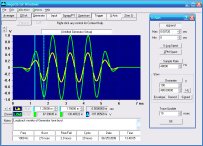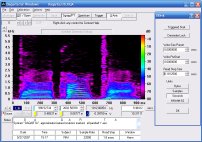![[LogoShip]](logo5.png)
Software for Windows
Science with your Sound Card!


Features:
Oscilloscope
Spectrum Analyzer
8-Channel
Signal Generator
(Absolutely FREE!)
Spectrogram
Pitch Tracker
Pitch-to-MIDI
DaqMusiq Generator
(Free Music... Forever!)
Engine Simulator
LCR Meter
Remote Operation
DC Measurements
True RMS Voltmeter
Sound Level Meter
Frequency Counter
Period
Event
Spectral Event
Temperature
Pressure
MHz Frequencies
Data Logger
Waveform Averager
Histogram
Post-Stimulus Time
Histogram (PSTH)
THD Meter
IMD Meter
Precision Phase Meter
Pulse Meter
Macro System
Multi-Trace Arrays
Trigger Controls
Auto-Calibration
Spectral Peak Track
Spectrum Limit Testing
Direct-to-Disk Recording
Accessibility
Data Logger
Waveform Averager
Histogram
Post-Stimulus Time
Histogram (PSTH)
THD Meter
IMD Meter
Precision Phase Meter
Pulse Meter
Macro System
Multi-Trace Arrays
Trigger Controls
Auto-Calibration
Spectral Peak Track
Spectrum Limit Testing
Direct-to-Disk Recording
Accessibility
Applications:
Frequency response
Distortion measurement
Speech and music
Microphone calibration
Loudspeaker test
Auditory phenomena
Musical instrument tuning
Animal sound
Evoked potentials
Rotating machinery
Automotive
Product test
Contact us about
your application!
Stuttering Sound Output
In order to simplify diagnosis, it is best to use the default Generator setup of a simple 440 Hz sine wave. If you have changed your setup, please go to Restore Default Generator Setup before you proceed here.
If you are using the default Generator setup but are hearing staccato or stuttering sounds instead of a smooth 440 Hz pure tone, try hitting the Pause button. This will stop the screen updates but not the sound output; if the stuttering goes away, the graphics system is the problem.
The stuttering is due to a conflict over system resources, and the most likely culprit is hardware acceleration of the graphics card: Especially on older systems, high acceleration settings may cause the graphics system to lock out all other processes, such as sound card operations, while the screen is being updated. Since Daqarta updates the screen repeatedly for real-time signal display, the sound stops briefly for each screen update.
To fix this, you may need to reduce your graphics accelerator settings. To find the proper control on a Win9x system (the most prone to this problem), go to:
Start - Settings - Control Panel - Display - Settings - Advanced Properties - Performance
On WinXP, the steps are typically:
Start - Control Panel - Display - Settings - Advanced followed by Troubleshoot once you get to the Advanced page. (Don't hit Troubleshoot on the Settings page.)
On Vista:
Start - Control Panel - Appearance and Personalization - Adjust Screen Resolution - Advanced Settings, then select the Troubleshoot tab and click Change Settings. Alternatively, right-click anywhere on the desktop, then Personalize - Display Settings - Advanced Settings, select the Troubleshoot tab, then Change Settings.
On Windows 7, 8, or 10:
Start - Control Panel - Appearance and Personalization - Display - Change Display Settings - Advanced Settings, then select the Troubleshoot tab and click Change Settings. You may need administrator privileges. The option may be disabled if there is no hardware support.
Move the Hardware Acceleration slider to the left. You will probably find that "Basic Acceleration" (second mark from the left end) solves the problem, so try that first. You may have to restart your sytem for this to take effect, so be patient.
If this fixes the sound problem, but you are unhappy with the graphics performance, you might want to try searching the internet for a newer driver for your graphics card. In order to enhance their rankings in reviews, some (especially older) graphics cards were released with drivers that gave absolute maximum performance on graphics benchmark tests, without regard for the consequences on the rest of the system. Updated drivers were later released that still gave good acceleration without shutting down everything else.
See also Troubleshooting
- Back to Distorted Input/Output Waveform or Spectrum
- Ahead to Restoring The Default Generator Setup
- Daqarta Help Contents
- Daqarta Help Index
- Daqarta Downloads
- Daqarta Home Page
- Purchase Daqarta
Questions? Comments? Contact us!
We respond to ALL inquiries, typically within 24 hrs.INTERSTELLAR RESEARCH:
Over 35 Years of Innovative Instrumentation
© Copyright 2007 - 2023 by Interstellar Research
All rights reserved